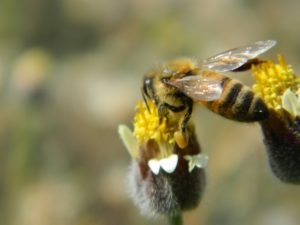The Value of Insects: Why We Must Act Now to Protect Them
 27 Januari 2023
27 Januari 2023

The rapid decline of insects is caused by multiple factors including climate change and agriculture, increases in the usage of insecticides and herbicides, deforestation, urbanization, and light pollution. Credit: Zadie Neufville/IPS
By Esther Ngumbi
URBANA, Illinois, USA, Jan 27 2023 (IPS)
Recently, the United States Department of Agriculture granted a conditional license for the first-ever honeybee vaccine. This is an exciting step that will protect bees from American foulbrood disease and ultimately help to stop the alarming decline in their numbers.
But the honeybee is just one of the many described insect species whose declining numbers has entomologists like me, environmentalists, and everyday citizens who love insects including Monarch butterflies worried. Across the U.S. and around the world there is a growing body of evidence and trend of insect decline. It’s so bad, that many are calling it the insect apocalypse.
Currently, there are over 1 million described species. But in study after study, review after review the story has remained the same: we are losing insects at unprecedented rates. The rapid decline of insects is caused by multiple factors including climate change and agriculture, increases in the usage of insecticides and herbicides, deforestation, urbanization, and light pollution.
Currently, there are over 1 million described species. But in study after study, review after review the story has remained the same: we are losing insects at unprecedented rates
Everyone should be worried about this trend. Insects, including bees, ants, butterflies, dragonflies, beetles, and grasshoppers, make up over 80% of terrestrial species on Earth. Insects are a keystone species that provide invaluable ecosystem services – from pollination, to biological control to serving as bio-indicators of healthy soils and streams.
Annually, in the United States, the economic value of the vital ecosystem services performed by insects is estimated to be $57 billion. In addition, over 75% of agricultural crop species and 85% wild flowering plants are pollinated by insects Furthermore, insects like dung beetles perform important functions like breaking down manure which is a service important to the U.S. cattle industry.
A world without insects would be disastrous. Insects are food to other species including birds and their demise would have catastrophic effects on food webs.
Human food and nutrition security also benefits from insects. Essential micronutrients in the human diet (antioxidants, vitamins A and C, lycopene, folic acid, and tocopherol) are derived from insect-pollinated crops, primarily citrus and other fruits and vegetables including tomatoes.
In total, pollinator mediated crops account for about 40% of global nutrient supply for humans. Conversely, the loss of insects can worsen hidden hunger (micronutrient deficiencies), which afflicts over 2 billion individuals globally. It can further threaten global food security and public, human, and environmental health. Ultimately losing insects contributes to decreasing biodiversity with a devastating impact on life on Earth.
Clearly, we need insects. The U.S. government, policy makers, scientists like me and everyday citizens should act with urgency to prevent further declines in their numbers
Protecting insects from national and global declines will require a combination of approaches including several actions that individuals can take.
First, since habitat destruction is among the largest drivers of insect declines, it is important that countries — beginning with the U.S. — create diverse landscapes. This includes forestland, meadows, and prairies to provide a variety of food and nesting resources for insects.
Everyday citizens can contribute to the attainment of this goal by planting native plants and maintaining pollinator gardens. In addition, individuals who keep lawns can consider converting them to diverse natural habitats.
Second, we must reduce insecticide and herbicides usage. Managing pests and weeds can be done by using integrated pest management approaches or integrated vegetation management approaches. These approaches promote the use of safer alternatives and encompass multiple non-chemical methods such as the use of resistant cultivars, trap cropping, and crop rotation.
Third, we can reduce light pollution. Evidence available suggests that light pollution is a driver of insect declines as it interferes with insect foraging, development, movement and their reproductive success. Simple actions like turning outdoor lights off at night can make a huge difference.
Fourth, do your part to help reduce carbon emissions. Climate change is among the biggest drivers of insect decline. Simple actions by everyday citizens like biking to work and using renewable energy sources can make a difference.
Fifth, you can choose to become an ambassador and advocate for insects and insect conservation. Begin by learning about the local, regional, national, and global policies that are in place to protect insects to prevent further insect decline.
Furthermore, encourage elected officials and all forms of governments – from local to state to federal — to pass laws and policies to protect insects while implementing measures such as setting aside protected land spaces including parks to serve as refuge spaces for insects.
Complementing the above actions is the need to support research and educational institutions, professional societies, and nonprofit organizations that are actively addressing insect decline issues through research and taking actions to protect our natural world and conserve ecosystems that are home to insect species. These include the Entomological Society of America , The International Center for Insect Physiology and Ecology, and The Xerces Society.
Finally, research and research funding are needed both now and in the future. This can help facilitate discovery of more insect species, monitor and document insect biodiversity across a diversity of landscapes and ecosystems and help us understand all facets of insect biology in natural and managed settings.
We need insects. Our ecosystems need insects. We must commit to doing something to protect them. Their existence is essential for a sustainable future.
Esther Ngumbi, PhD is Assistant Professor, Department of Entomology, African American Studies Department, University of Illinois at Urbana-Champaign
